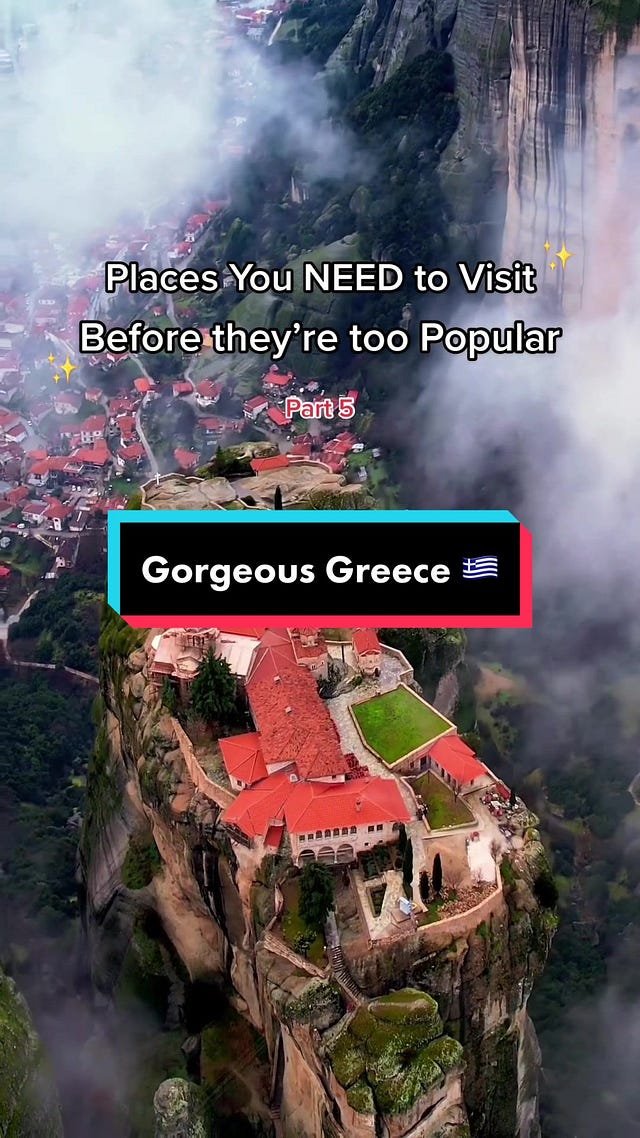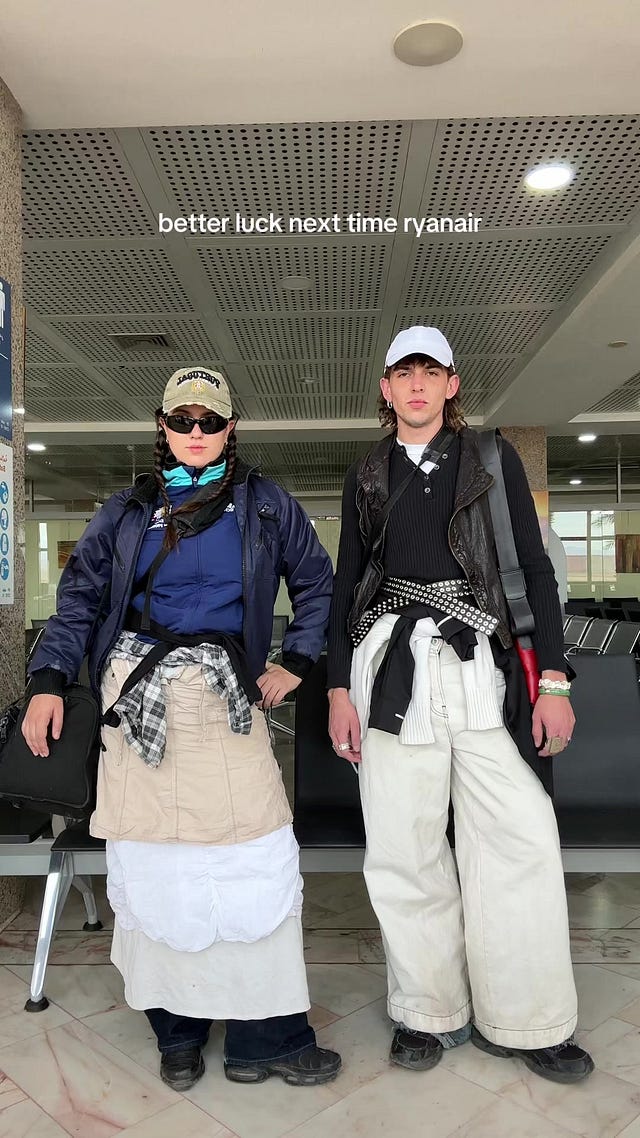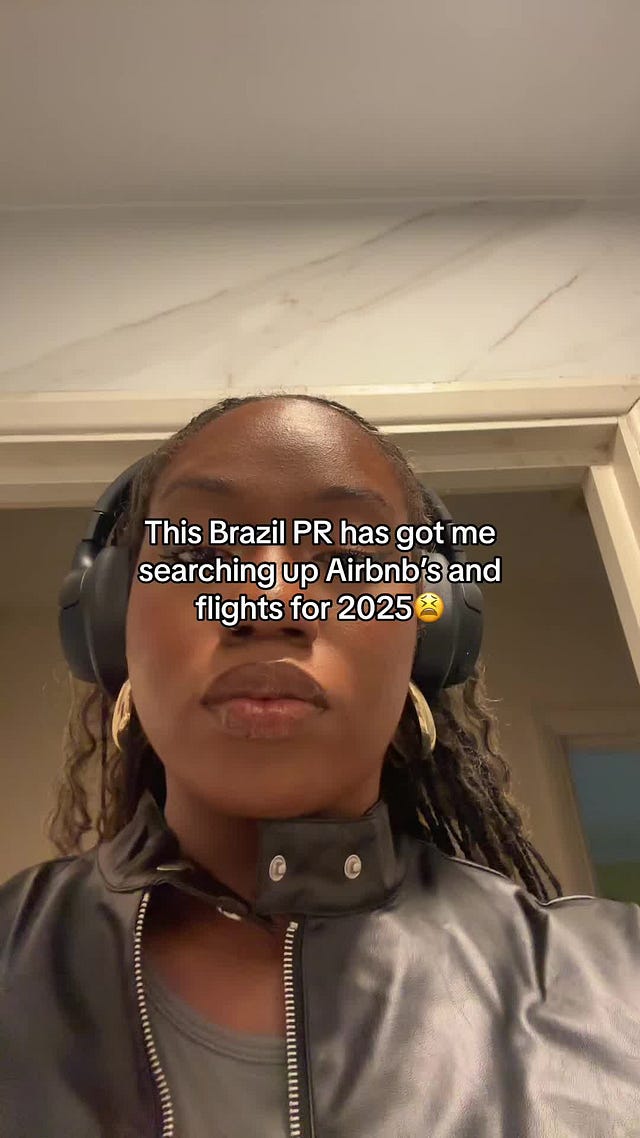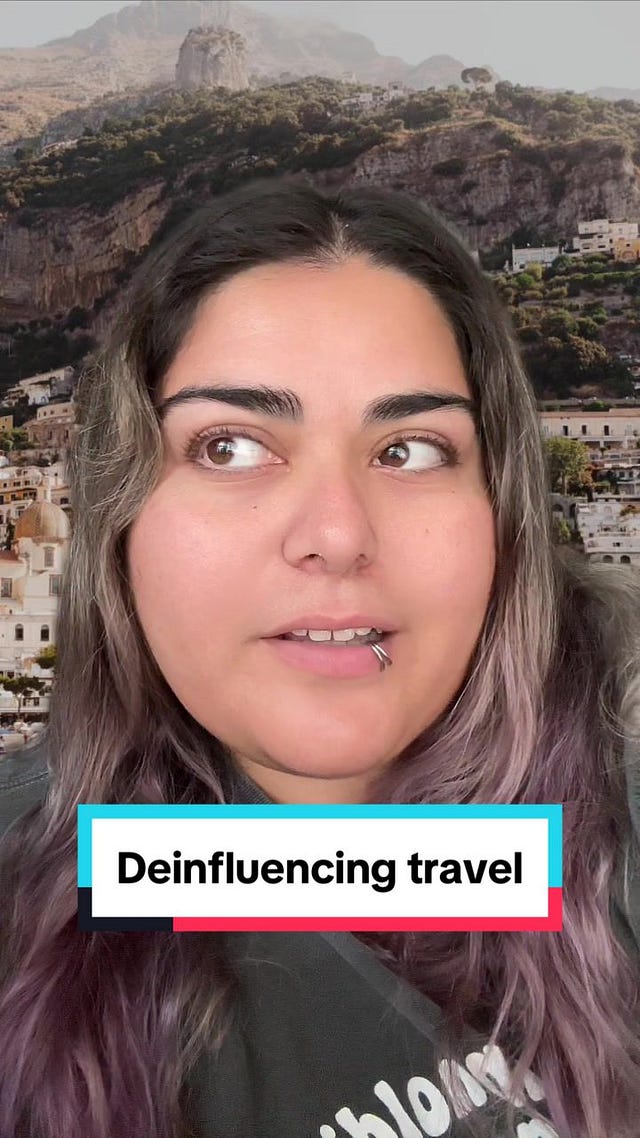The death of awe: How digital voyeurism is changing travel
Has chasing escapism online ruined travel?
MØRNING. It's no secret that digital voyeurism has wreaked havoc on the way that we travel. From the cult-ification of digital nomad culture, to year-long creator cruises and now clubbing in airports, escapism has never felt so easy, or so necessary. But in today’s landscape, what does escapism really mean? With our attitudes to travel permanently skewed by the mini-universe living in our back pockets, achieving escape is supposedly just a viral TikTok, Trippin guide, or house swap away. But what does this collapsed proximity between us and our ✨dream destinations✨spell for culture and the planet?

 Tiktok failed to load.
Tiktok failed to load.Enable 3rd party cookies or use another browser
First, let's set the scene. It’s the year 2024 and tourists are being sprayed by water guns in Barcelona, while white westerners encourage others to quit their jobs and explore the ‘enchanted mysticism’ of Southeast Asia. Men are raw dogging flights, and the Duolingo owl has 3x more followers than Gabbriette. You can dream of the Bánh mì you watched Anthony Bourdain eat in Vietnam, feeling real limerence for a place you’ve never been to. We can circumnavigate the globe each night on TikTok, but the mirage of ourselves as foragers, or nomadic food content creators will surely fade by morning.
 Tiktok failed to load.
Tiktok failed to load.Enable 3rd party cookies or use another browser
And when it finally comes down to securing that yearly getaway, our pick-n-mix climate consciousness, fear of being labelled a tourist, and motivations of decidedly ‘ethical hedonism’ seep in. If you manage to serve your way through security a la Denma’s mood board, TikTok shop cabin certified duffel in hand, it's easy to convince yourself that this trip is just as much a content opportunity as it is a holiday. Armed with a catalogue of saved viral videos, notes app recommendations from friends listing must-see gatekept spots, you board the flight toward escapism, for real this time.
So how exactly has this digital voyeurism warped the way we travel?
Let’s break down the evidence.
Exhibit A: Lisbonification: the rise and fall of the digital nomad.
 Tiktok failed to load.
Tiktok failed to load.Enable 3rd party cookies or use another browser
Now, the popularity of destinations is often directly linked to their social media presence: first it was Lisbon dominating our feeds, then Rio de Janeiro, Marseille and Tokyo. We are more likely than ever to choose our next travel destination based on minute-long aesthetic videos, watering whole countries down to “Five things to do in XXX.”
This phenomenon, aka "Lisbonification", refers to the nomad-ifying of certain hotspots, fuelled by digital trend cycles. As one of the first countries to introduce a digital nomad visa, Portugal attracted many remote workers incentivised by a better work-life balance, lower living costs, and warmer climates. The negative impact of these new hubs is well documented, but less so is the role that the content economy plays in their expansion: the alarming amount of trust that we place in algorithms is creating supercharged travel trends, causing modern travellers to act en masse and putting insane amounts of pressure on singular destinations. As FOMO’ing whole countries feels increasingly surreal, is it time to stop and ask who the travel algo really serves?
Maybe we’d be wise to take a leaf out of Japan’s book, where handwritten essays detailing personal motivations are required for work or extended stays: and don’t be mistaken, visitors are often turned away for lack of intentionality, proving that a more grounded approach to travel is possible.
Exhibit B: Tourism: a dirty word.
The fact is, the internet is making tourists out of all of us. So why does no one want to be called a tourist anymore? MØRNING’s Creative Strategist Yus Ntahilaja explains, “A tourist goes around the city, not through it. I want to visit a place knowing about it, not as a tourist”. Dexter, 26, agrees, "there needs to be a shift from entitled tourism to informed tourism, where pride is taken in learning before, during, and after your visit, moving from a transactional approach to one of genuine exchange." Marriott’s are out, masking your cultural proximity (or lack thereof), is in. Now, travellers can ‘Belong Anywhere’ (a la Airbnb), from an Italian palazzo with its own Wikipedia page, to an ex-council-owned block in Peckham, the world is your oyster.
So is it time we truly acknowledge the entitlement of travellers, and their relentless search for the road less travelled? MØRNING’s Letty Cole argues, “obviously, we need to respect cultures instead of objectifying them. But that doesn’t mean we can (and should) try to live like a local in every place we visit. We’re starting to strangle cultures and communities, rather than honouring them.” This is proven in rising trends of locals fighting to gatekeep whole districts of cities, areas of natural beauty and even their favourite menus. “As travel becomes more and more accessible globally, we need to prepare to accommodate more tourism, while ensuring we stay in our lanes as tourists”, Letty adds. Educate yourself on the conscious choices available to you, and actively try to understand relevant cultural sensitivities.
Exhibit C: Regaining awe in the digital age
And here we arrive, at ‘awe fatigue’, the final pathetic consequence of our rabid digital voyeurism. As destinations increase in popularity and algorithms flood with identical copies of content, visitors' genuine experiences become distorted, and the very concept of awe becomes an ever distant dream. Despite multiple studies showing that the cultivation of awe is relatively easy, it's the excessive self-focus, loneliness and cynicism of our times which prevent us from experiencing it: and these negative ways of thinking have become perpetuated in our digital-to-IRL pursuits.
Josh, 26, from London, shared his experience: "On a recent trip to Portugal, my partner and I visited some coves we saw on TikTok. When we arrived, we were disappointed—the place looked nothing like the video. We felt tricked." And the growing reams of ‘de-influenced travel suggestions’ only add to the despair of it all (see below video).
 Tiktok failed to load.
Tiktok failed to load.Enable 3rd party cookies or use another browser
Maybe this is the ultimate proof that digital voyeurism has warped our perspective. In this world of increasing digital intimacy, is awe really lost, or is it our sense of reality that's been forgotten? With respect for the countries we are fortunate enough to visit, perhaps it’s time to shift our relationship with travel content, from reliance to reference. Put down the phone for a second, and find awe for real.
As democratic access to travel increases, genuine experiences of awe should too. So perhaps we should stop being so afraid of looking a little closer to try to find it, by travelling somewhere new within our home countries, or ditching TikTok itineraries in favour of brushing up our own instincts.
Ultimately, whether you take notes from content creators, swear by Lonely Planet guides, or raw-dog flights for inner-peace, travel is a deeply personal experience that shapes our lives for the better. As rapper Central Cee says, "Live Yours".
There you have our travel round up. What style of travel works best for you, readers? And is awe really dead? Let us know below.
Words: Zac Baker
Thumbnail image: @delphi.vc
Editors: Sui Donovan, Letty Cole










This was so good thank you! And as a Barcelona resident, I also think it’s vital we look at how some big luxury conglomerates throw their weight around with big events that often result is harmful and disruptive tourism, ie the American Cup.
Love this. P.s. What is rawdogging flights? (I’m from UK and am either too old to understand it or its an american term im not familiar with)